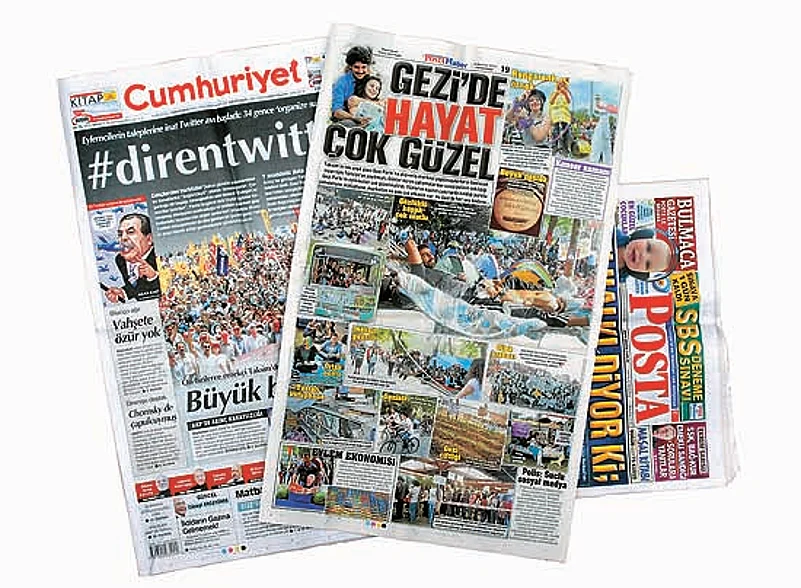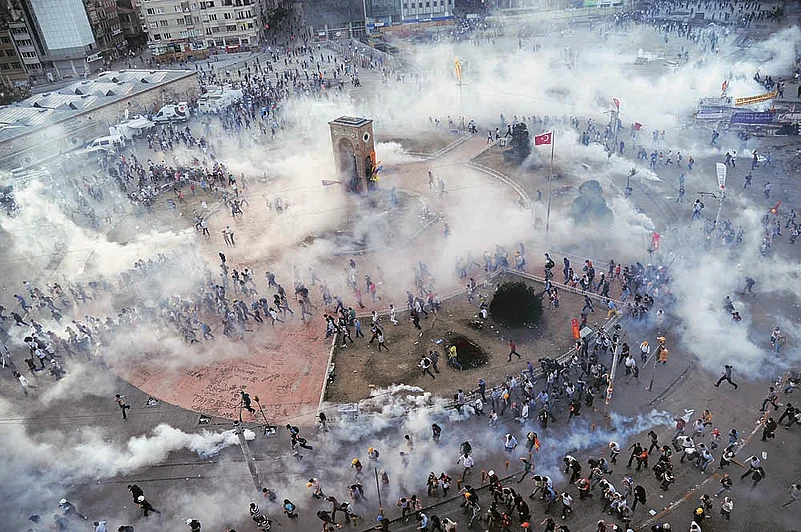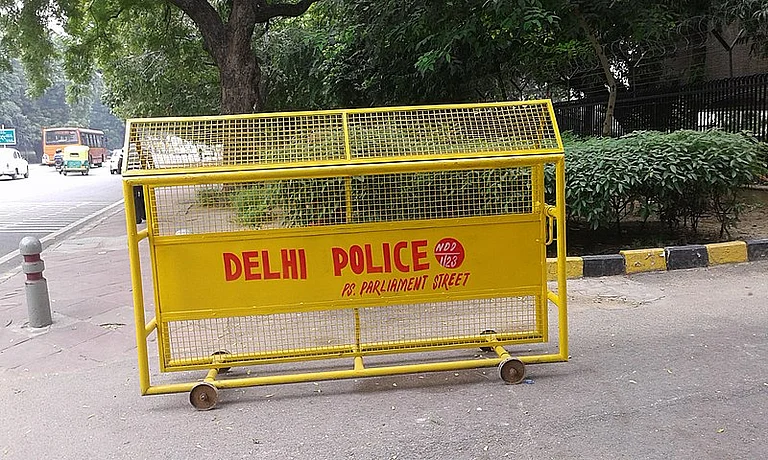At Taksim Square, it was a carnival as long as it lasted. There was music and dancing, there was yoga, there was free food and there were dogs in sunglasses with placards round their neck that read, ‘If I cannot shit in the park, I will shit in the mall’, mocking the government, which wanted to put up a shopping mall in Gezi Park round the square. There were dervish dancers wearing gas masks to mock the police (with posters that read: ‘police say they have gas’) and young people holding hands, kissing, having beer, snoozing in hammocks or just reading books while others pitched tents and camped.
A steady stream of people, many of them women, reached the square and soaked in the atmosphere. Few public protests had been such fun till riot police moved in this week and cleared the square. By then, protests had spread across Turkey; after 12 days, clashes with police officially left five dead, including a policeman, and 7,000 injured.
The posters and graffiti at Taksim were laced with humour. ‘USA—Steve Jobs, Italy—Blow Jobs, Greece—No Jobs and Turkey—Police Jops (clubs in Turkish)’, read one. Another just stated, ‘Pepper spray makes the skin beautiful’, while a third one asked, ‘The bums are here, Erdogan, where are you?’ Another wag wrote on the street, ‘I know the rules but rules don’t know me’.
People had initially taken over Taksim Square to protest official plans for Gezi Park. But, on the second day of the siege, the police reacted with a dawn crackdown of such savagery—spraying people with pepper, plastic bullets, teargas and water jets—that it sparked off a nationwide outrage against police brutality, the government’s growing intolerance to dissent, its muzzling of the media (more journalists are in jail in Turkey than in China), imposition of more conservative Islamic values and finally, the growing authoritarianism of Prime Minister Recep Tayyip Erdogan.
One could sense the resentment against Erdogan days before the siege. Ali, a young hotel manager, felt the government behaved irresponsibly by encouraging Syrian rebels, which led to an exodus of refugees from Syria, a glut of terror attacks in Turkey on the border, and tension between the two countries. As many as 50 were killed in two car bomb blasts at Reyhanli, a border town, on May 11 and Ali darkly hinted that Turkey was being led to the brink of war. He was also critical of the government scaling down festivities on the birth anniversary of Mustafa Kemal Ataturk, the founder of the Turkish Republic, traditionally observed as Youth Day.
But for tourists in Istanbul, many of them from India, there was little to suggest the groundswell of frustration following the initial clash at Taksim Square. Young Turks jived in the basement disco at the hotel till late at night; teenagers hugged and kissed in trams. Anglers were busy catching fish below the Galata bridge and people on the banks of the Bosphorus smoked and watched boats sailing past. It was almost idyllic.
A strong economy, a weak opposition, an investment boom and tourism under Erdogan had prompted the Western world to hail Turkey as a model state, a shining example that Islam and democracy could coexist. When Erdogan visited Egypt after the Arab Spring, he was greeted like a rock star. Some of that goodwill appears to have been frittered away. Quite unnecessarily, it would appear.
In his memoir named after Istanbul, the city he put at the centre of his writing, Orhan Pamuk writes about a 50-year-old chestnut tree which the authorities wanted to cut down. He recalls how residents had parked themselves around the tree and kept a vigil till officials backed off. The tree, he recalled last week in The New Yorker, still stood there, and added: “Today Taksim Square is Istanbul’s chestnut tree”.
The incessant reference by young Turks last month to Mustafa Kemal ‘Ataturk’ (or Father of the Turks), who died 75 years ago in 1938, was striking. The contrast with young Indians’ indifference to Gandhi and Nehru, I reflected, was stark. A few days after the current unrest at the beginning of June, it became clear that Turks’ concerns went beyond Gezi Park, that the conflicting visions and ideas of Ataturk and Erdogan were at the heart of the growing discontent.
While Ataturk had felt “Islam would be elevated if it ceases to be a political instrument,” Erdogan was imprisoned in 1998 for reciting the following poem in public: “The mosques are our barracks/The domes are our helmets/The minarets our bayonets/And the faithful our soldiers”.

While Ataturk believed in women’s emancipation, encouraged them to wear western clothes and introduced coeducation in schools, Erdogan has endlessly lectured Turkish women against abortion, on the need to put on headscarves, to be modest in dress (and to eschew ‘revealing’ western attire) and manners and bear three children each. He has stopped coeducation in schools and banned sale of alcohol, including beer, before 10 am and after 6 pm.
Erdogan’s critics accuse him of a touch of megalomania and cite his plans to construct a mosque to outshine all other mosques in Istanbul, dig a second Bosphorus canal and build a third airport in the city as proof. His supporters fault the protesters of going too far and of harming the economy in the middle of the tourist season, saying they are a minority.
Erdogan remains enormously popular, however, and is credited with turning around the economy, initiating reforms, making a determined bid to get Turkey into the EU and with initiating peace talks with Kurdish rebels, besides ruthlessly shearing the military’s political ambitions.
But a third electoral victory in 2011, with over 50 per cent of votes in his favour, turned his head, say critics. “He mistook the mandate as a mandate for himself, a mandate for him to rule the country as his household,” wrote a commentator wryly.
The onslaught on freedom of expression since 2011 has witnessed a record number of journalists being imprisoned. The media have been browbeaten into self-censorship. So much so that the three most popular TV channels in Istanbul initially blacked out the police action at Taksim, screening a documentary on penguins and culinary shows instead. When Erdogan addressed his supporters at Istanbul last week, seven daily newspapers in the city came out with strikingly similar front-page headlines, in what western commentators wryly pointed out was a “Pravdaesque coincidence”. The reference was to the two prominent newspapers in the former USSR, Pravda and Izvestia. While the meaning of one was ‘news’, the meaning of the other was ‘truth’, with the joke being that Pravda was not Izvestia.
A man who made Turkey richer and freer than ever, Erdogan is now being described as a ‘deaf’ sultan. Commentators are baffled at his inability to defuse a relatively small environmental protest, and allowing it instead to snowball into a major political crisis.
But Erdogan watchers point at his ability to be flexible. He was friendly, they point out, with both Muammar Gaddafi of Libya and Bashar-al-Assad of Syria. But he switched sides and lent his weight to the rebels in the two countries. They hope he will be able to display similar dexterity and win over the dissenting voices. Or would he rather win the battle and lose the war?
By Uttam Sengupta in Istanbul

























